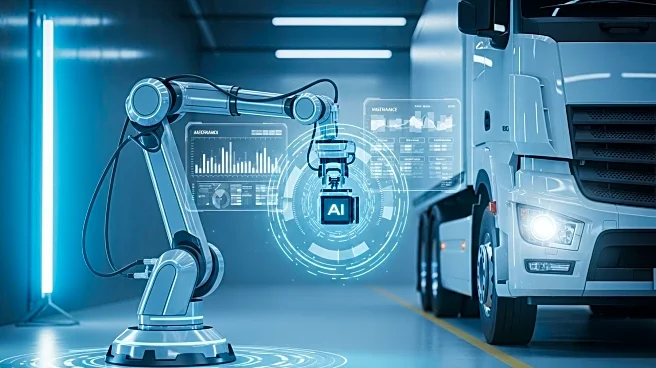What is the story about?
What's Happening?
Artificial intelligence (AI) is transforming fleet maintenance in the trucking industry, offering significant cost-saving benefits. AI technology is being utilized to enhance predictive maintenance, helping fleets manage costly breakdowns, unexpected parts shortages, and recurring repairs. By monitoring fleet data in real-time, AI systems can detect anomalies such as vibration, temperature, and pressure, signaling potential equipment failures before they occur. This proactive approach allows maintenance teams to schedule repairs in advance, reducing roadside breakdowns and improving truck uptime. The integration of AI into fleet operations is reshaping various aspects, from front-office sales to back-office finance, and is improving driver morale through optimized routes and streamlined delivery processes.
Why It's Important?
The adoption of AI in fleet maintenance is crucial for the trucking industry, which faces numerous challenges including natural disasters, supply chain disruptions, and fuel price volatility. By reducing costly breakdowns and improving efficiency, AI technology helps fleets maintain productivity and competitiveness. The ability to predict and prevent equipment failures not only saves costs but also enhances safety and reliability in trucking operations. As AI continues to evolve, its impact on fleet management will likely expand, offering new opportunities for innovation and efficiency in the industry.
What's Next?
The trucking industry is expected to further integrate AI technologies into fleet operations, exploring new applications and benefits. As AI systems become more sophisticated, fleets may adopt additional AI-driven solutions for route optimization, fuel management, and driver assistance. The ongoing development of AI technology will likely lead to more advanced predictive maintenance capabilities, further reducing operational costs and improving fleet performance.
Beyond the Headlines
The use of AI in fleet maintenance raises ethical and legal questions, particularly regarding data privacy and the potential displacement of human workers. As AI systems take on more roles traditionally performed by humans, the industry must address concerns about job security and the need for workforce retraining. Additionally, the reliance on AI for critical maintenance tasks necessitates robust cybersecurity measures to protect sensitive data and ensure system integrity.














